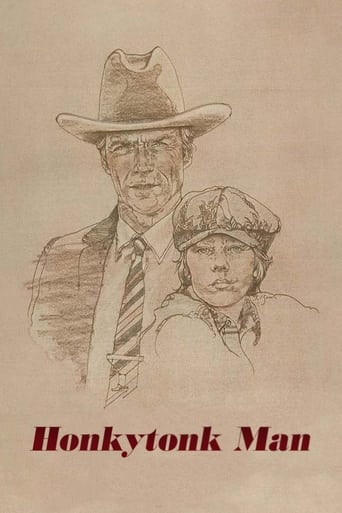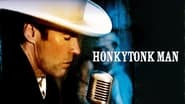Bolesroor
"Honkytonk Man" is like a dust sandwich... it's like being sucker-punched by a theme-park cowboy in Pioneer Town and lying on the ground while he pours Luke-warm Dr. Pepper on your face... it's like having to listen to a toothless old man with a guitar ramble on about days gone by, telling bold-faced lies and forgetting the lyrics to popular songs...Okay, maybe I'm exaggerating just a little, but not by much. Clint Eastwood stars in and directs this coma-paced country/western daydream without any sense of plot, or urgency, or tension. Or humor.Clint plays Red Stovall, a country singer stricken with tuberculosis, except as usual, Clint is really just playing Clint, only this time he has a guitar. The movie floats from one vague encounter to another without any highs or lows or emotional significance. Clint plays a bad ass, then a balladeer, then a good ol' boy, then a bandit, without ever connecting any of the dots. The movie looks like it's stitched together from deleted scenes from Clint's other movies. That's not a compliment.The movie is a long, dry, musty road trip through the Depresson-Era dust bowl. And guess what?!? Grandpa's coming along for the ride! (That should liven things up.) I can't remember any movie ever seeming more LONELY... none of the actors elicit any kind of emotional response. Verna Bloom pops up to alert us that she's still lactating in her mid-forties, and Alexa Kenin is the bangable pubescent we'd all love to find in the trunk of our car.Other than that there's nothing going on here. I can't imagine what drove Clint to make this film, or how he could possibly justify its two hour-plus runtime. I'd prefer the sucker punch and Dr. Pepper.GRADE: D+
Woodyanders
Clint Eastwood, looking drawn, rumpled and weathered, takes a radical, courageous departure from his usual reliably stalwart tough guy persona in this gently moving, defiantly unheroic and very low-key seriocomic 30's Depression-era set drama as Red Stovall, a boorish, feckless, dissolute, alcoholic drifter, failed would-be country-and-western singer/songwriter and general all-around worthless, ill-tempered and irresponsible rapscallion with an unfortunate knack for getting into trouble, messing things up and making life hell for everyone who gets close to him. Slowly dying from tuberculosis, Red makes a lengthy, arduous pilgrimage from Oklahoma to Tennesse to make his dream of performing at the legendary Grand Ole Opry come true, taking his foolishly awestruck nephew Whit (nicely played by Clint's then 14-year-old son Kyle) and his frisky grandfather (a superb John McIntire) along with him. During their eventful odyssey Whit breaks Red out of jail after Red is arrested by drawling good ol' boy sheriff Jerry Hardin for stealing chickens, Red takes Whit to a whorehouse so the boy can lose his virginity, and the group has colorful encounters with an obnoxious, conniving teenage girl (a perfectly irritating Alexa Kenin) who tries to dupe Red into believing he impregnated her, grubby mechanic Tracey Walter, venal highway patrolman Tim Thomerson, and mean, untrustworthy bar owner Barry Corbin prior to Red arriving in Nashville for his do-or-die audition, only to erupt into a coughing fit in front of the hard-nosed talent scout (a marvelous cameo by John Carpenter movie regular Charles Cyphers) while in the middle of belting out the wonderfully regretful and reflective titular song. Eastwood's subtle direction doesn't in any way force the wry humor or delicately heart-breaking sentiment found in Clancy Carlile's folksy, quietly observant script, allowing the story's considerable poignancy to stem naturally from the characters and the experiences they have. Eastwood furthermore delivers an excellent and convincing performance as Red, an atypical Eastwood lead who's initially quite unappealing and only becomes endearing in the picture's tragic closing sequences in which Red's deep-seated yearning to belatedly realize his potential and subsequently be somebody makes itself touchingly apparent. The rest of the cast, which also includes Verna Bloom and Matt Clark as Red's tolerant, long-suffering relatives, are every bit as fine.The elegant, lyrical cinematography by Bruce Surtees gives the film a misty, lived-in look that's a beguiling blend of warm heartfelt nostalgia (Eastwood was born in 1930 and partially grew up during the Great Depression; he traveled about the country with his itinerant laborer father during this troubled time) and scrappy downcast authenticity. Noted country-and-western producer Snuff Garrett was the music supervisor for the stand-out soundtrack; such famous and revered singing stars as Ray Price, Porter Wagner, Frizzell and West, blues singer Linda Hopkins, and especially Marty Robbins have telling bit parts -- Robbins, who died shortly before the movie opened theatrically, has a lovely moment as a back-up session musician who assumes lead vocal chores when Red becomes too weak and sickly to finish the song himself. Eastwood sings a few numbers with a frayed, raspy, worn-out baritone -- it's a hoarse, yet affecting croak which bespeaks countless years of hard living and heavy drinking with a bracingly matter-of-fact directness. Why, "Honkytonk Man" even comes complete with a provocative philosophical message: Sometimes it's the people you expect the least from who teach us the most about life. Unjustly vilified by most critics and ignored by audiences when it first came out, this tender little gem deserves to be rediscovered as one of Clint Eastwood's most surprising and adventurous as well as thoughtful and underrated change-of-pace cinematic excursions that he has ever made to date.
jamesbond
This film is one of Eastwood´s most compelling and strikes you right at the heart. It tells us a story with such a warmth and compassion about a theme as old as America itself. It is about a man and his love for his nephew, his music and his his desire to make a name for himself before his TB´ll end it all. Though Clint´s voice isn´t the best it does however strengthen our understanding of the motivation of a man that is running against time in a setting that is both harsh and unforgiving. The movie´s depiction of the depression is outstanding and the songs are stupendous. Watch for Marty Robbins who also sings half the theme song. All in all an outstanding movie that will stay in your heart for a long, long time...



